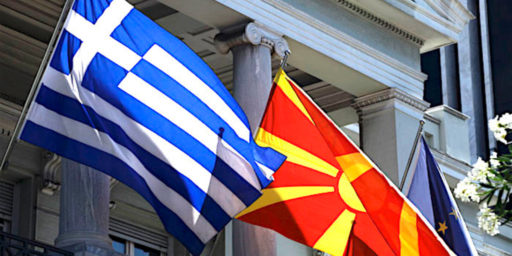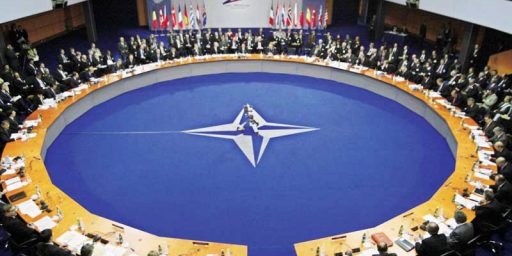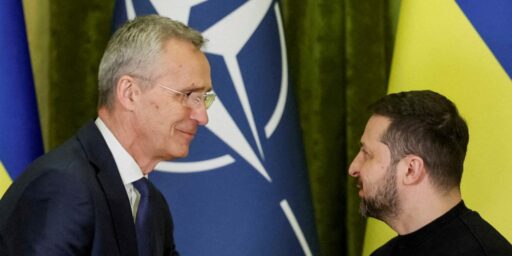NATO Adds Albania and Croatia, Rejects Macedonia, Georgia, Ukraine
Despite — or perhaps partly because of — backing from the United States, the North Atlantic Treaty Organization has denied membership to Macedonia and rejected a bid to grant Membership Action Plans to put Georgia and Ukraine on a one-year path to membership in the Alliance. BBC:
Nato has confirmed it will not yet offer membership to Georgia or Ukraine after the 26-member alliance was split amid strong objections from Russia. Moscow said Nato’s promise that the ex-Soviet republics would join one day was a “huge strategic mistake”. At a summit in Romania, Macedonia was also denied Nato entry but Albania and Croatia were given the green light.
US and Czech officials agreed to base a missile defence radar on Czech soil, a plan that has also angered Russia. And President Nicolas Sarkozy indicated France would return next year to the Nato military command it left in 1966 in protest at the dominance of US commanders. He also said hundreds of extra French troops would be deployed to Afghanistan, easing fears of a crisis within the Western coalition there.
[…]
US President George W Bush had called for Georgia and Ukraine to be allowed to join. But the move was opposed by Germany and France, amid concerns voiced by Russia over Nato’s eastward expansion.
Nato Secretary General Jaap de Hoop Scheffer told a news conference Georgia and Ukraine would become members eventually. The alliance decided not to offer Ukraine and Georgia a membership action plan – a gateway to membership – but agreed on Thursday to review this in December. Georgian diplomats said they were “not happy” with the delay but welcomed the promise of eventual membership.
Macedonian officials said their rejection was a “huge disappointment” that would undermine stability in the Balkans. The US had also called for Macedonia to join but this was strongly opposed by Greece, which has a northern province that is also called Macedonia. It argued that the former Yugoslav republic’s insistence on being known as Macedonia implied a territorial claim.
As the Alliance grows further outside its traditional sphere, accession of new members gets more complicated. There are legitimate concerns over the readiness of all of these prospective members to contribute to the security goals of the Alliance. At the same time, allowing Russia to dictate demands as to the ability of sovereign states to enter into treaties is quite problematic.
And, as Steven Taylor notes, the “Macedonia” situation almost defies logical discourse.
Ultimately, though, this is bad news. I’ll explain why in a longer post later today.





What do these new countries bring to the table? It seems to me that NATO continues the trend of getting more and more watered down, almost a mini UN – I won’t pretend to be an expert on NATO affairs, but I just don’t understand the point of admitting these countries since we are only going to have to give them money/arms etc… If it is for training opportunities for our military, I doubt they would turn the opportunity to train with our folks w/ or w/o membership. It seems to me that we are having enough problems with current members doing enough that furthers US interests IE Iraq/Afghan.
I’d be more sympathetic to the Ukrainian entry if there was some evidence that the country at large wanted it. As things stand, the population, even in the pro-Western parts of the country, seem to be deeply sceptical.
I can understand the line that it’s not a good thing to actively appease Russia at the expense of plucky, formerly-oppressed Eastern European democracies. But I don’t really see much point in provoking even worse relations when the only people who seem to want the move to go ahead are the Bush administration and a rickety Ukrainian government that is acting in opposition to public opinion on this issue. The game just doesn’t seem worth the candle to me.
Presumably, Macedonia’s rejection was due, at least in part, to Greek opposition while rejecting Ukraine and Georgia was to mollify Russia.
It’s interesting that to some degree membership seems to depend on how Western a country is. Is that a good thing?
NATO is not Macedonia’s friend
It has become clear at the NATO’s summit in Bucharest that NATO is not willing to stand for the freedom, the right of self determination and territorial integrity of Macedonia and the Macedonian people. So what’s the point of Macedonia joining NATO anyway? Instead of standing up for justice and human right, NATO has taken the side of the Greek’s nationalist and irredentist and their fight for exclusive right to Alexander the Great, Ancient Macedonia and all the history of the Macedonian region. Which is of course just a cover up for the Greek’s real agenda: to kill the Republic of Macedonia and the Macedonian nation. This agenda is centuries old. The torture, the killing and the ethnic cleansing of the Macedonians in the Macedonian region is well documented and available to whoever wants to research this matter for his/her own, instead of listening to Greeks lies. This agenda will continue until there is no more Macedonians and Republic of Macedonia. And despite all the claims of friendship and support, NATO has betrayed Macedonia and the Macedonian people in the most cynical and humiliating way. It has led the Macedonians all the way to Bucharest just to get the slap in their face. Their cynicism continues with claims that despite the slap in the face of the Macedonian people, NATO is still supportive of Macedonia’s membership, if and when Macedonia ceases to be Macedonia. How absurd and how insulting can NATO get? And how and what can justify NATO’s behavior? Are Macedonia and the Macedonian people disposable and can be treated with no dignity and respect? Why is it okay to address the Macedonians with racial and nationalistic slurs and respect from them that they give up everything that they identify with? What happened with ‘all people should be treated equal?’ We, the Macedonians are deeply insulted and hurt by this treatment, but we have no other option but to endure just like other peoples have endured torture, humiliation, segregation, slavery, ethnic cleansing and genocide.
After the NATO’s summit in Bucharest, the Macedonians’ aspiration to join NATO has become an absurd. The only thing that the NATO member countries can do to separate themselves from this shameful injustice and discrimination of a sovereign and independent country and its people is to recognize Macedonia by its own constitutional name, if they haven’t already done so.
Dave,
It wasn’t about appeasing russia, as the UK’s Malcolm Rifkin, a conservative former Defence Secretary, explained:
Regards, C